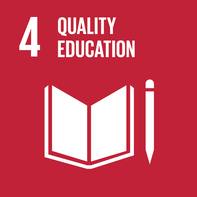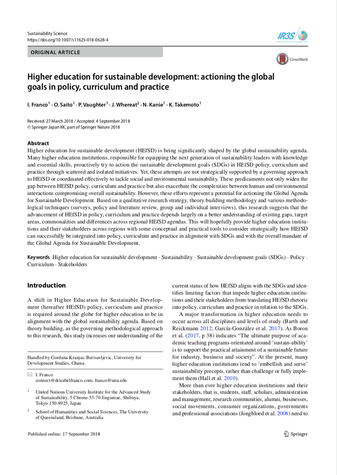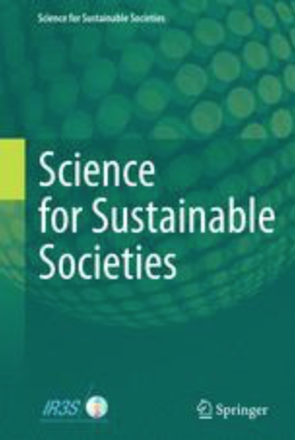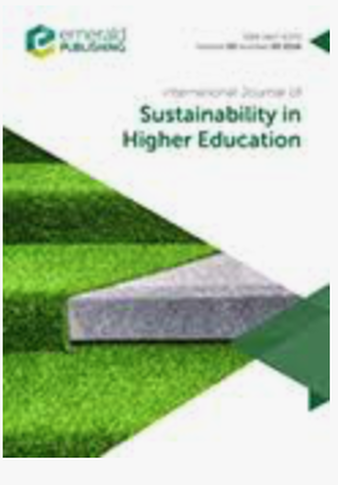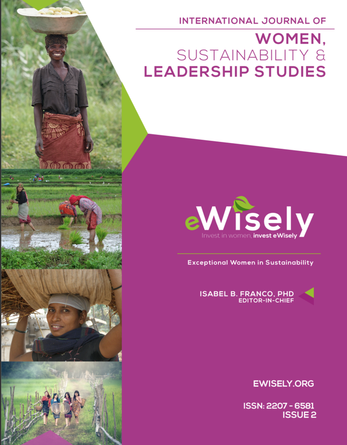Higher Education for Sustainable Development: Actioning the Global Goals in Policy, Curriculum and PracticeParticipant Stakeholders: United Nations University- Institute for the Advanced Study of Sustainability UNU-IAS, The University of Queensland
Exceptional Women in Sustainability: Dr. Isabel B. Franco (Founder eWisely). Impact: Higher education for sustainable development (HEfSD) is being significantly shaped by the global sustainability agenda. Many higher education institutions, responsible for equipping the next generation of sustainability leaders with knowledge and essential skills, proactively try to action the sustainable development goals (SDGs) in HEfSD policy, curriculum and practice through scattered and isolated initiatives. Yet, these attempts are not strategically supported by a governing approach to HEfSD or coordinated effectively to tackle social and environmental sustainability. These predicaments not only widen the gap between HEfSD policy, curriculum and practice but also exacerbate the complexities between human and environmental interactions compromising overall sustainability. However, these efforts represent a potential for actioning the Global Agenda for Sustainable Development. Based on a qualitative research strategy, theory building methodology and various methodological techniques (surveys, policy and literature review, group and individual interviews), the outcomes of this project found that the advancement of HEfSD in policy, curriculum and practice depends largely on a better understanding of existing gaps, target areas, commonalities and differences across regional HEfSD agendas. This will hopefully provide higher education institutions and their stakeholders across regions with some conceptual and practical tools to consider strategically how HEfSD can successfully be integrated into policy, curriculum and practice in alignment with SDGs and with the overall mandate of the Global Agenda for Sustainable Development. This project was led by our Founder Dr. Isabel B. Franco, from idea to execution. |
Click on image to access full document
|
Governing Education for Sustainable Development: Towards Inclusive and Equitable Quality Education
Participant Stakeholders: United Nations University - Institute for the Advanced Study of Sustainability, The University of Queensland
Exceptional Women in Sustainability: Dr. Isabel B. Franco (Founder eWisely); Ellen Derbyshire, Leader for eWisely Australia Impact: This project provided a contribution to the achievement of the Sustainable Development Goal 4, Quality Education (SDG 4) through analysing stakeholder partnerships and collaboration for the implementation of Education for Sustainable Development (ESD). The outcomes of the research argue that a better understanding of limiting and fostering factors preventing greater collaboration for ESD is required in order to meet the targets set by SDG 4 which advocates for Inclusive and Equitable Quality Education. This research project provides a multi-level governance analysis (global, national and institutional) on ESD and key stakeholders’ perceptions on limiting and fostering factors in collaborative governance for ESD. It also increases our understanding of whether ESD policy developed at the international level can be imagined at the national, institutional and local levels and highlights the factors involved in collaboration for ESD. This hopefully helps us understand how to develop rhetoric that can advance from policy to impact. Conclusions drawn from these analyses highlight key inconsistencies and gaps that resulted from incompatible perspectives and motivations for realizing ESD at all levels of governance. |
Click on image to access full document
|
Community Capacity-building for Sustainable Development: Effectively Striving towards Achieving Local Community Sustainability TargetsExceptional Women in Sustainability: Isabel B. Franco, Ph.D Founder, eWisely
Participant Stakeholders: United Nations University- Institute for the Advanced Study of Sustainability UNU-IAS and University of Western Australia Impact: There is a general concern in the scholarly literature pertaining to global sustainability research and education agendas and their real-life effectiveness for local communities. Yet there are many unanswered questions in this area. The research derived from this project increases our understanding of these questions and how they can be addressed. Based qualitative research, this chapter presents priority community capacity-building areas for education for sustainable development. It also shows that improving identified areas seems from this study to be the most effective way to enhance the ability of local communities to cope with pressing global sustainability challenges over time. This research project paid nuance attention to the nature and importance of community capacity-building for fostering SDG 4 quality education in the pursuit of sustainable development. |
Click on image to access full document
|
Inclusion of Women in Social Vulnerability in The State Of Mato Grosso (Brazil): Extension Program Teresa Of BenguelaExceptional Women in Sustainability: Léa Paula Vanessa Xavier Corrêa de Morais
Participant Stakeholders: Federal Institute of Education, Science and Technology of Mato Grosso (IFMT) Impact: The Teresa de Benguela Extension Program aims to foster inclusion of women at social risk. The program’s name is an homage to a warrior woman who saved many lives at the State of Mato Grosso. In 2017, the Federal Institute of Education, Science and Technology of Mato Grosso (IFMT) provided education to more than 200 women across 12 different areas in various municipalities of the State of Mato Grosso. The program consists of three components: Women empowerment in the field of psychopedagogy. This stage is based on the methodological tool Mapa da Vida. The second component is based on technology. Women are encouraged to attend technology training, so they can later get a job in the labour market. The third component is entrepreneurship. During this stage, women are provided with training about entrepreneurship and are taught how to set up their own business and produce at a commercial scale. At this stage, whilst women study, they also add value to their lives. Founders agree that they are preparing women to embark in the labour market and become citizens with dignity. This study was published in Portuguese in the International Journal of Women, Sustainability and Leadership Studies. |
Click on image to access full document
|
